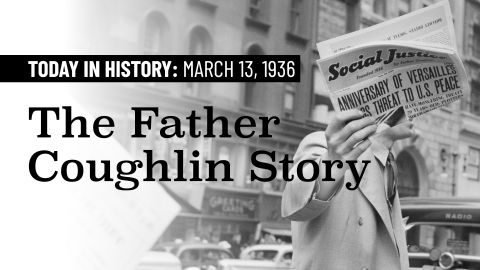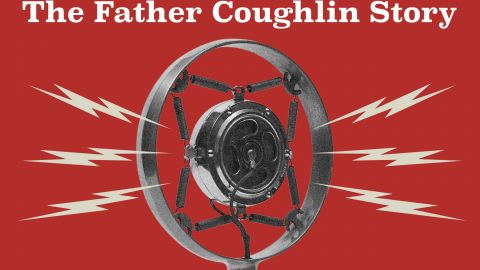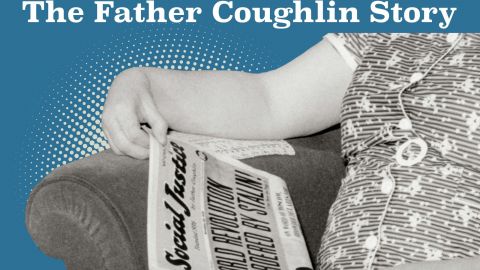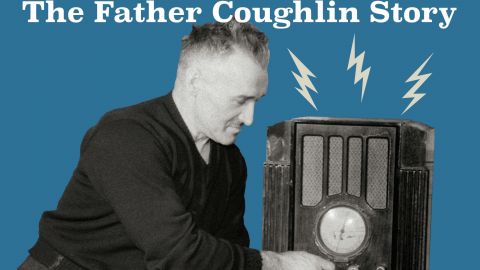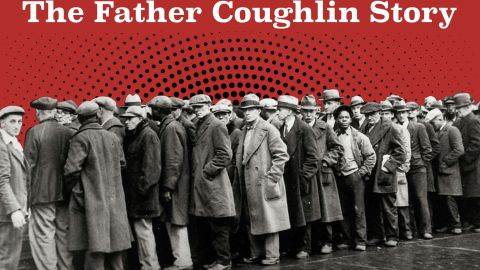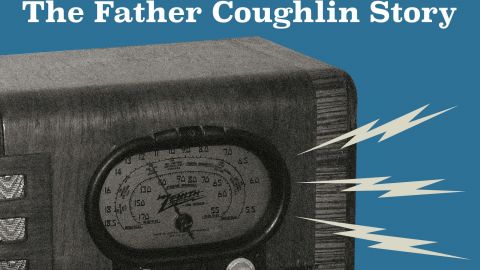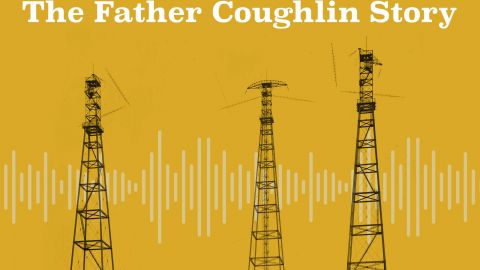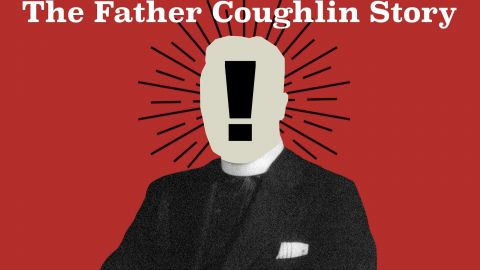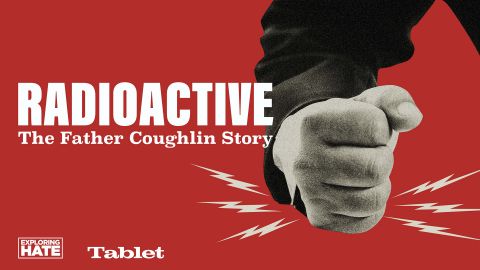The following is a production of Tablet Studios in association with The WNET Group’s reporting initiative, Exploring Hate: Antisemitism, Racism and Extremism, and with support from Maimonides Fund.
Andrew Lapin: When he first appeared on the national political stage, Franklin Delano Roosevelt inspired many as the savior who could lift America out of the depths of the Depression. By 1935. FDR, now president, was losing steam. Some said he was just another tool of the rich and powerful, another fat cat whose policies weren’t doing enough for ordinary Americans. While some of his recovery efforts were working, eight million unemployed Americans weren’t. This created an opening for a bold opponent to rise and challenge the president. One man came forth to do just that. He was born to a poor family of Louisiana farmers, and even though he was brilliant enough to skip seventh grade, he was soon kicked out of school for inciting a rebellion against the principle. He went to work as a traveling salesman, and was so poor that he had to borrow $10 from his fiancee’s family to pay for their wedding reception. Huey Long wasn’t bothered at all. Soon, he told his new wife, I’ll be governor and then in no time president.
Andrew Lapin: Part one of the plan worked out smoothly. Long won the Louisiana governor’s race in 1928, with the largest margin ever recorded in the state’s history. He was 35, the youngest man ever to hold the office. There was no mistaking his intentions.
Huey Long: How many men ever went to a barbecue? And would let one man take off the table what they intended for nine-tenths of the people to eat? The only way you’ll ever be able to feed the balance of the people is to make that man come back and bring back some of that grub he ain’t got no business with!
Andrew Lapin: I’m Andrew Lapin and this is Radioactive, an eight part series from Tablet Studios and Exploring Hate about the life and legacy of Father Charles Coughlin, whose story we’ll return to in a few moments.
Andrew Lapin: Huey Long was riding the wave of economic inequality that had divided the country. His populism was charming in stump speeches, backyards and town halls. But when he became governor, he ditched the charm and dialed up his desire for dominance. Long soon rewrote the state’s constitution, giving himself dictatorial powers, which he then used with impunity to replace the governor’s mansion and sic the National Guard on businesses he didn’t like. But even that wasn’t enough. Long wanted the White House. Once there, he said he’d finally make things right for working class Americans.
Huey Long: 75 to 80 to 85 percent of the people not only give up their property year after year, but they go further and further and further into economic slavery to where the flesh and blood of the born and the unborn will never be able to raise the debt, let alone come back and rescue the properties that they’ve lost from these depressions.
Andrew Lapin: By 1935, FDR was keenly aware of the danger posed by Huey Long, who by that point was a U.S. senator. The so-called Kingfish and his Share Our Wealth agenda could go a long way in times of economic uncertainty. FDR warned that Long was the most dangerous man in America. The celebrated journalist H.L. Mencken, called Long a backwoods demagogue, and the Atlantic magazine asked Long if he was a fascist. “Fine,” he answered, “I’m Mussolini and Hitler rolled into one.”
Andrew Lapin: Strolling through the streets of Baton Rouge, Long was even surrounded by his own King’s Guard, a group of armed men he nicknamed the Cossacks, named after the Russian paramilitary groups known for carrying out violent pogroms against Jews. A secret poll commissioned by James Farley, the chairman of the Democratic National Committee, showed Long winning up to 10 percent of all votes in a hypothetical presidential election. If he chose to run as a third party candidate, he could split the Democratic vote and cost FDR his reelection. But American politics then has now had a way of taking unexpected turns. On September 8th, 1935, Long spent the day successfully gerrymandering the district of a political opponent, Judge Benjamin Pavey. At 9:20pm, after signing the bill that would essentially remove Pavey from office, Long stepped out of the state Capitol building. Carl Weiss, a local eye doctor, and Judge Pavey’s son-in-law, approached Long outside the Capitol. Weiss raised his arm, revealing a gun. He pulled the trigger, once hitting Long in the torso. Long’s Cossacks, in turn, fired 60 bullets at the assassin, killing him instantly. As Long lay dying from the bullet wound, in the arms of his assistant, Gerald L.K. Smith, he was said to have croaked out, “Don’t let me die. I have so much more to do.”
Andrew Lapin: Huey Long might have been dead, but the anti-FDR movement’s desire to find someone to challenge the president was alive and well. The right man for the job would have to be well-liked, a good orator, and the sort of guy who can mix promises of welfare with thinly veiled accusations against those mysterious others who were always at work, sabotaging America and the American Dream.
Charles Coughlin: I ask you in the name of Christianity, which abhors Communism, in the name of patriotism, which loved America to carry it on to victory. I ask you if you will rise in your places and pledge with me to restore America for the Americans.
Andrew Lapin: The National Union for Social Justice was born. Its architect was Father Charles Coughlin. This is Radioactive, episode six: Social Justice.
Radio announcer: As another presidential election approaches, a Roman Catholic priest for the first time in American history is seriously involved in national politics.
Charles Coughlin: God hates a hypocrite!
Radio announcer: Father Edward Coughlin today is far more than just a valuable voice over the radio. At his Shrine of the Little Flower near Detroit, converge elements of a mighty political power, a power that grows with every name added to the 12 million already in his letter files.
Andrew Lapin: Father Coughlin’s soured relationship with FDR taught him a valuable lesson. It wasn’t enough to merely be a celebrity, a popular voice who could tell people to vote for this guy, or that. If you wanted real power, you had to build your own movement. With Huey Long dead, Coughlin was ready to step right into the vacuum.
Radio announcer: With every handshake, that adds another individual to colossal following, which he has welded into the most potent political lobby this country has ever known. A single voice, National Union for Social Justice.
Andrew Lapin: The National Union for Social Justice. The name was perfect, capturing an aura of theological indignance and resonating with true believers, as well as down-on-their-luck, everyday Americans. Coughlin capitalized on the movement with his own national newspaper. Social Justice Magazine was a serious periodical, complete with correspondents reporting across the globe and a regular editorial titled “From the Desk of Father Coughlin.” On his radio show, the announcer repeatedly pitched the magazine, reminding the audience that subscribing to Social Justice was the best way to support Father Coughlin.
Radio announcer: As you know, these broadcasts are made possible and are paid for at commercial rate, because of the magnificent support which you have extended to Father Coughlin directly and because of your support of Social Justice Magazine.
Meghan Courtney: You know, if I told you there was a newspaper that was called Social Justice and one of its principles was labor’s right to organize, you’d be surprised at the things that you actually see printed in this magazine.
Andrew Lapin: Meghan Courtney is an archivist at Wayne State University in Detroit, which holds copies of Social Justice magazine.
Meghan Courtney: I would say a lot of the things in there are inflammatory at best, super racist. It gets very anti-Semitic. He meant something else when he meant social justice. He interestingly said that social justice in the late thirties was beginning to be enacted in Italy and Germany. So this is when Hitler has really started to put in a lot of his things into place. He meant social justice for Christian Aryan people. He meant that restoring their past dignity that he sees as having been removed, that’s what he means by social justice, not equality, necessarily.
Andrew Lapin: The content of Social Justice magazine was a far more extreme version of Coughlin’s radio shows and provided a useful window into what the adherents of its namesake movement actually believed. Typical headlines included “Jews boycott Hearst for aiding Father Coughlin” and “Do communists control New York City schools?” Marco Greenberg, the PR executive we heard from in episode three, thinks Coughlin’s use of the phrase “social justice” was his most brilliant marketing tactic.
Marco Greenberg: What could be better? What is more bullet proof from left and right and middle than a term like that, that sounds so logical, that sounds so needed? That is so relevant in any time? But obviously he used that for nefarious purposes.
Andrew Lapin: Social Justice was the vanguard of a potent political movement. Still, Father Coughlin was only one man, so the priest got down to the business of recruiting fellow travelers. The obvious first step was to reach out to Gerald L.K. Smith, Huey Long’s second-in-command and co-founder of the Share Our Wealth movement. The man who had held Long as he died was a natural choice to inherit his followers. It was a match seemingly made in heaven. Like Coughlin, Smith was a preacher, in his case, Presbyterian and a fiery orator of right wing populist causes. He even had his own radio show
Radio announcer: Exhorting the lunatic fringe is today is one of Huey Long’s henchmen who, little more than a year ago, was unknown outside the red clay parishes of Louisiana.
Oh, are you THE Gerald Smith from Louisiana? Nope! Just Gerald Smith from everywhere. Everywhere people need a friend and a leader.
Andrew Lapin: He associated himself with the Silver Shirts, an American pro-Nazi group. He also published a newspaper, like Coughlin, only his was called “The Cross and the Flag,” and it praised Hitler and other fascist leaders. Smith was also wildly anti-Semitic. His Christian Nationalist platform called for all Zionists to be deported and for the dissolution of groups he called “Jewish Gestapo organizations.” One of the biggest goals of his movement, he said, was “the preservation of our Christian faith against the threat of Jew Communism.” Then there was Frances Townsend, a 66 year old, soft-spoken, retired physician and an unlikely face of the elder-care reform movement.
Radio announcer: Frances Everett Townsend, a country doctor, long experienced in human suffering, sat up nights trying to find a simple cure for the nation’s economic depression.
Andrew Lapin: After witnessing two older women diving through dumpsters, Townsend became an advocate for an aggressive national pension plan for the elderly, to ensure no one would have to become destitute as they grew old. His Townsend Plan called for every American over the age of 60 to be paid $200 every month. It gained so much support in Congress that its existence pressured Roosevelt, in 1935, to create the Social Security Administration, a far less generous manifestation of Townsend’s vision. Even once Social Security became a reality, the doctor continued to push his own plan across the nation.
Frances Townsend: The Social Security plan of the administration is wholly unfair, inadequate and unjust. But the Townsend plan will immediately restore prosperity.
Andrew Lapin: Like Coughlin, Townsend knew the value of grassroots organizing in San Francisco.
Radio announcer: A local chapter of an amazing American movement holds its weekly meeting to bring these elderly people are active believers in the so-called Townsend Plan, which was considered dead when Congress adjourned last August, but which today is very much alive.
Andrew Lapin: Coughlin, Smith and Townsend had a shaky partnership —three wildly different personalities, united only by their hatred for Roosevelt, coalescing under one banner. Coughlin, ever the media entrepreneur, put his branding practices into overdrive. The National Union for Social Justice was soon touring the country, holding rallies to packed houses and emerging as the one stop clearinghouse for radical American ideas. As Coughlin explained, his party endeavored to fight for the common people against the tyranny of the elite bankers and the Communists.
Charles Coughlin: Then as now we support the program of social justice for all. Social justice, not only for the bankers or the industrialists, but social justice for the laborer, the farmer, the professional man, the homeowner, the housewife, the youth and the millions of little children who are unnecessarily denied our participation in the wealth of this nation.
Andrew Lapin: As much as Coughlan might have envisioned himself sitting in the White House, the Vatican didn’t allow clergy to run for public office, and the Constitution wouldn’t let a Canadian like him become president anyway. So Coughlin, Smith and Townsend had to find a new candidate, one who could match them in heated rhetoric and passionate grandstanding for their cause. Instead, they found William Lemke, Republican congressman from North Dakota, proud farmer and a total wet blanket on the campaign trail.
William Lemke: When I am president, I shall see to it that these planks are made and enacted into law, and then I shall not be a candidate for reelection. After that, there will nothing left to be done, that requires any great courage, and either Mr. Roosevelt or Landon will make a fairly good president after that.
Andrew Lapin: Lemke wasn’t any good at campaigning, but the fact that this group of radicals recruited a sitting member of Congress to their ticket, spoke to their growing influence in the country. Even without a decent candidate, the Union for Social Justice campaign was fiery. Across the country, headlining raucous rallies, Father Coughlin finally got to do what he always dreamed of doing.
Charles Coughlin: It is written in the Constitution of the United States that Congress has the right to coin, issue and regulate the value of money. That’s good Americanism, and it’s good enough for me. Every politician today, in the Democratic or Republican ranks, sits upon of the thrones of the mighty does not believe in that part of the Constitution. They don’t want to believe in that part of the Constitution. They are not even Americans, these so-called Democrats and Republicans.
Andrew Lapin: Often Coughlin and Smith would go toe to toe at these rallies, furiously competing for who could rile up the crowd the most.
Gerald L.K. Smith: These great, phenomenal assemblies, whether they be headed by Dr. Frances E. Townsend, Charles Smith, or Father Charles E. Coughlin, represent the unmistakable edict that is being issued to the corrupt, thieving politicians of America, that the baby-havin’, stump-grubbin’, gold-meetin’, God-fearin’, American people are about to take over the United States Government of America.
Andrew Lapin: To stay in the spotlight, Coughlin had to keep finding ways to one up his rival. So when it was his turn, he tore off his white priest’s collar mid-speech and thrust it to the ground in a grand display of passion. His biographer, Don Warren, described the moment as the Father literally defrocking himself before the crowd.
Charles Coughlin: Therefore write to your Congressional district representatives, form your battalions, take up the shield of your defense, unsheathe the sword of your truth and carry on so that are Communists on the one hand cannot scourge us, and that the modern Capitalists on the other cannot slave us.
Andrew Lapin: Why was Coughlin allowed to be so public, so brazen in his hatred and calls for violence? It was because the people who were in charge of him didn’t say anything.
Radio announcer: But in the Roman Catholic Church, a priest is answerable only to his immediate superior and Father Coughlin’s is his staunchest ally — 68 year old Bishop Gallagher.
Bishop Gallagher: Father Coughlin has faced no heresy. I dare not interfere. Until a lawful superior rules otherwise, I stand steadfastly behind this priest.
Andrew Lapin: Many people wrote to Bishop Gallagher demanding that he do something about Coughlin. In a pamphlet Gallagher published in response, he wrote, “I fear no persecution, which will result from any priest’s preaching of social justice.
Radio announcer: The only lawful superior to Bishop Gallagher is in the Vatican. Queries there about Father Coughlin bring no response, but the Monsignor Emito Chicognani, personal representative of the Pope in America, comes a statement: “What the Holy Father teaches, Father Coughlin preaches.”
Andrew Lapin: Why was the Vatican so hands off when it came to Coughlin? To find out, I talked to Charles Gallagher. He’s an ordained Jesuit priest, a former police officer and now a historian at Boston College. He’s no relation to Bishop Gallagher
Charles Gallagher: In terms of the Vatican perspective, it came out of left field. They were unprepared to deal with it, mainly because Father Coughlin was the first priest to adequately understand the transnational and global reach of this new medium called radio. The governance of how a priest approaches his duties is set up within Canon Law. That code had not been revised since 1917, when radio was in its infancy, and it never directly addressed how priests were to conduct themselves on the radio. By and large, the Vatican delegated and deferred authority about such matters to the local bishop. The problem with Coughlin is that he blurred the lines between what was local and what was global.
Andrew Lapin: While the church was looking the other way, Coughlin was using his radio show to solicit campaign funds. He spent most of the funds donated to the National Union for Social Justice on travel and goods for himself and on a giant convention in Cleveland. There was little left in the campaign budget for Lemke, his candidate, to actually campaign, but that Cleveland convention, held in August 1936, was indeed a sight to behold. 10,000 people, and many members of the national media, gathered to hear Coughlin thank them for supporting his movement.
Charles Coughlin: Ladies and gentlemen, I sincerely thank you from the bottom of my heart for the honor which you have conferred upon me. Your affirmation has made me feel very small indeed, simply because I have some small appreciation of the tremendous responsibility which is mine. I shall do my best to be your leader. One thing I do know I will never turn my back upon, cost what it may and will never send you out or any patronage.
Andrew Lapin: With the nation’s ears all tuned to him, and with his adoring fans now clustering to root for his political groundswell, what would Father Coughlin speak about? Poverty, maybe? Or welfare or taxes, or anything else that might fit into the category of social justice? Not really. Instead, Father Coughlin wanted to talk about the Jews.
Charles Coughlin: You appreciate the fact to my dear friends, that, among other things, in the National Union for Social Justice, we are Christian insofar as we believe in Christ’s principle of love your neighbor as yourself, and with that principle, I challenge every Jew in this nation to tell me that he does not believe in it.
Andrew Lapin: After he finished his speech, Coughlin collapsed and had to be escorted out of the convention as the crowd thundered in response to his words. It was the sort of political theater America had hardly ever seen before, and it worked like a charm. It’s not that Coughlin really believed Lemke or his party would ever win the presidency. Instead, he had done some back of the envelope calculation, and he had every reason to believe that the Union for Social Justice could soon emerge as a major force in American politics. It could be powerful enough to make or break candidates and command the allegiance of congressmen and senators. If his movement didn’t win at least nine million votes, he told an adoring crowd at one rally, he would retire from the radio for good. Roosevelt, popular as he was, had reason to fear the towering demagogue and the movement behind him. The United States might not be immune to the evils drowning out Europe: Communism in Russia, Fascism in Italy and Nazism in Germany. Books like “It Can’t Happen Here,” a satire by Sinclair Lewis imagining the rise of a hypothetical American demagogue, became bestsellers/ Lewis wrote of a heartland Hitler who rose to convince his fellow Americans that democracy was overrated and that the problems of the Great Depression merited not only a New Deal, but a new form of government. One of the characters in the book, a radio priest named Bishop Prang, is an obvious stand-in for Father Coughlin. The real Coughlin was sliding ever closer into revolutionary territory as the election drew nearer, he spoke freely of FDR as a tyrant who needed to be overthrown by any means necessary. Speaking before 25,000 supporters in Providence, Rhode Island, he thundered that if Roosevelt was elected, there would be, quote, “more bullet holes in the White House than you could count with an adding machine.” On Tuesday, November 3rd, 1936, Americans headed to the polls. They had a stark choice laid out in front of them. They could choose Roosevelt, the phenomenally popular incumbent who had delivered the New Deal, and for now was keeping America out of war. They could choose Alf Landon, the Republican challenger from Kansas. Or they could pick from an assortment of third party candidates, including William Lemke and the National Union for Social Justice, in their first ever ballot appearance, publicly and loudly backed by Father Coughlin.
Charles Coughlin: Are you going to leave this country worse than you found it or are you going to fight for your children?
Andrew Lapin: When the votes were counted, FDR emerged victorious. In fact, he emerged more than victorious. He carried 46 out of the 48 states, won the support of 27 million Americans and delivered the most lopsided presidential victory in modern history. Again. Poor Alf Landon only carried Maine and Vermont. And the National Union for Social Justice, Father Coughlin’s movement? It attracted eight hundred and ninety two thousand voters, far fewer than the nine million the radio preacher had predicted. True to his word, Coughlin left the airwaves. For two months. Then in January of 1937, Bishop Gallagher died. For more than a decade, Gallagher had been Coughlin’s supporter and friend, the one who’d taken a chance on him with that parish in Royal Oak, and lately the only buffer between him and the growing frustration of the Vatican. In response to the death of his biggest ally, Coughlin proclaimed that it had been Gallagher’s dying wish to see him resume his radio show. To honor his superiors legacy, he would break his earlier vow of silence and return to weekly broadcasts. H.L. Mencken, that sharp-tongued chronicler of American politics, quipped that Coughlin was already in collapse and that his return would prove sad and anemic. The priest had something else in mind. His path to political respectability now blocked, he devised other plans. Plans that would bring him into direct conflict with the government and drive him to form a paramilitary group that could finally defeat the source of all his problems: those Communist Jews.
Charles Coughlin: I know how the followers of Marx crushed out liberty in Russia, Spain, and elsewhere. I know what they would do on the streets of New York and Detroit and Pittsburgh and Philadelphia, today, if they fought with the power to accomplish their ends. Before they grow more forceful and powerful, and it will not be long until they have done so, before then, it is time to eradicate them mentally, spiritually, and physically from our midst. Thus, combat today is between the so-called Popular Front and the Christian Front. It is a combat upon whose outcome the destiny of America hinges. Its destiny of happiness and victory for labor, or misery and slavery for labor. Where do you stand? What do you plan to do? Which emblems do you want to fly alongside the stars and stripes? The hammer and sickle or the cross of the crucified redeemer?
Andrew Lapin: Next week. Sedition. Radioactive is hosted by me, Andrew Lapin, and is a production of Tablet Studios in association with The WNET Group’s reporting initiative Exploring Hate: Antisemitism, Racism, and Extremism, and with support from Maimonides Fund. The show was produced and edited by Josh Kross and Robert Scaramuccia with help from Quinn Waller. Our managing producer is Sara Fredman Aeder. Our executive producers are Liel Leibovitz and Stephanie Butnick. Our theme music is from the Ghostwriter and was composed by Alexandre Desplat. All speeches and material of Father Coughlin are authentic to the source, as well as music and other audio from his radio program. Additional archival audio in this episode courtesy of Getty Images. Special thanks this episode to Irv Drasnin, director of “American Experience: The radio priest,” the Walter P. Reuther Library at Wayne State University and the digitized Father Coughlin Archives at the University of Detroit-Mercy. Charles Gallagher’s new book is called “Nazis at Copley Square,” and it’s filled with revelatory, terrifying details about Father Coughlin and his followers. Pick it up wherever books are sold. This episode was recorded at Michigan Radio, Ann Arbor’s NPR station. Our recording engineer is Peg Watson. Please go rate and review us wherever you listen to podcasts. For more information about the show and all of Tablet’s podcasts, please visit tabletmag.com/podcasts.
Major funding for Exploring Hate has been provided by: The Sylvia A. and Simon B. Poyta Programming Endowment to Fight Antisemitism, Sue and Edgar Wachenheim III, Charlotte and David Ackert, The Peter G. Peterson and Joan Ganz Cooney Fund, and Patti Askwith Kenner. For a complete list of funders, please visit pbs.org/exploringhate.

